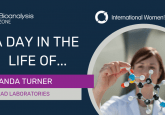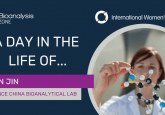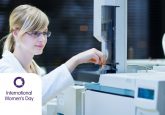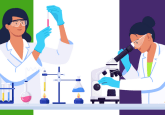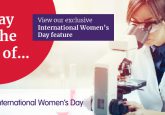Advice to my younger self with Teona Roschupkina, Sara Underwood and Amanda Hays

Bioanalysis Zone is celebrating International Women’s Day and acknowledging the often challenging career paths of female bioanalysts. We spoke to leaders in the field, Teona Roschupkina, Sara Underwood and Amanda Hays, to reflect on their careers so far and highlight the resources and mentors they use to support their career development. This is the first interview in our four-part series to recognize female leaders in bioanalysis.
Meet the experts
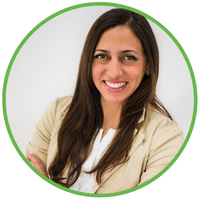
Amanda Hays
Scientific Officer, Senior Director
BioAgilytix (NC, USA)
Amanda offers more than a decade of lab experience in multiple fields including pharmacology, drug metabolism, immunoassays, immunogenicity, biomarkers, flow cytometry and qPCR. In her current role, Amanda serves as a Scientific Officer and provides global scientific leadership and technical guidance at BioAgilytix. Amanda is the Chair of the AAPS biomarkers and precision medicine community and the AAPS qPCR working group, among other volunteer leadership positions.
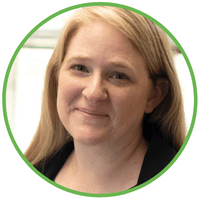
Sara Underwood
Pharmacokinetic (PK)/Toxicokinetic Analyst
Alturas Analytics (ID, USA)
Sara is the PK Analyst and Lead Technical Writer at Alturas Analytics and has over 20 years of experience in the biotechnology and pharmaceutical industry. Sara joined Alturas in 2014 and is committed to being part of a team that is paramount in supporting the fight against diseases. Having built the PK team from the ground up, Sara is a valuable member of Alturas’ operational team and a highly respected scientist among her peers.
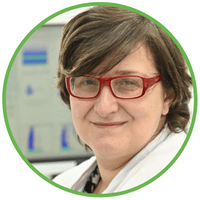
Teona Roschupkina
Principal Scientist
DDS, Alliance Pharma (Fordham, UK)
With 24 years experience as a specialist in flow cytometry, Teona has worked as a Research Engineer at Lund University Flow Cytometry Core Facility (Sweden) and later as a Principal Scientist at DDS, Alliance Pharma and is a leader in her field. Teona completed her PhD in haematopoietic stem cell transplantation and tolerance at Lund University.
Questions
Amanda:
- 2012: Research Scientist at Xenotech LLC (KS, USA)
- 2014: Research Scientist III at Viracor-IBT Laboratories (KS, USA)
- 2015: Senior Scientist at Viracor Eurofins Labs (KS, USA)
- 2016: R&D Manager at Viracor Eurofins Labs
- 2017: Associate Director of Bioanalytical Science at PRA Health Sciences (KS, USA)
- 2020: Director of Bioanalytical Science, PRA Health Sciences/ICON PLC (KS, USA)
- 2021-present: Scientific Officer at BioAgilytix (NC, USA)
Sara:
- 21–23 years old: Research Associate, ZymoGenetics (WA, USA)
- 23 yrs: Transitioned to Pharmacokinetics (PK)
- Moved to Seattle Genetics (WA, USA) to work with clinical PK before a family move to Moscow, Idaho (USA)
- Present: Joined Alturas Analytics, a contract research organization (CRO), as a Technical Writer and built the Pharmacokinetic team from the ground up
Teona:
- 18–22 yrs: Bachelor’s Degree, while volunteering at Immunology Department, Tbilisi State University (Georgia)
- 3 months in University College London (UK) – TEMPUS/TACIS project
- 21–24 yrs: Master’s degree at Immunology Department, Tbilisi State University (Georgia)
- 3 months in University College London-TEMPUS/TACIS project
- 22–24 yrs: Immuno-Haematologist at Jo Ann Medical Centre Blood Bank (Tbilisi, Georgia)
- 24–27 yrs: Immunohaematologist at Haematology Institute (Moscow, Russia)
- 27–32 yrs: PhD studies at Lund University Stem Cell Centre (Sweden)
- 33–40 yrs: Research Engineer in Flow Cytometry at Lund University Flow Cytometry Core Facility (Sweden)
- 40–Present: Principal Scientist at DDS, Alliance Pharma
Amanda: I think a lot of the mentors that I have had throughout my career have been serendipitous. I am very thankful to have been in positions where I was surrounded by other scientists who were very supportive and encouraging. In those situations, I felt comfortable enough to seek advice and have very helpful conversations with those individuals who were ultimately mentors and made a big impact on my career.
Sara: My first mentor happened to be my manager, who introduced me to PK and was very influential in guiding my career path. She spent a lot of time and energy investing in my career development. Other mentorships have just grown organically through working relationships.
Teona: I strongly believe that mentorship starts at a very early age. I remember my uncle – a physics teacher – showing me a battery and touching two wires together showing sparks and explaining that this is exactly what was happening in the sky during a thunderstorm. I could not have been more than 5 years old.
I had plenty of mentors at school, having a knack for chemistry, biology and maths. Our chemistry teacher volunteered her own time to mentor those of us with good aptitude to chemistry and helped us to get into inter-school competitions.
My first true mentor, or rather role model, was my aunt who was a Molecular Biologist. She would tirelessly tell me interesting facts about everything and anything, keeping me keen for more. I was shy and would get tongue tied and most of our exams were oral. So, she taught me a phrase that is applicable to any subject in the field of biology and I use it to this day: “biological systems are diverse”. It would help me get started and then it was easy.
Amanda: I think people are your best resource. There’s nothing better than being able to learn from others! There are a lot of really great scientific organizations like the American Association of Pharmaceutical Scientists (AAPS) and others that offer support for women in science. I have also always worked for companies that had a lot of resources and networking opportunities for women in science.
Sara: My environment turned out to be my best resource. My first job was at a unique biotech company where the culture was one of having fun, while also being supportive of one another across departments. I was surrounded by very bright people, all of whom shared the same passion and were eager to help one another. The environment was also very diverse; there were a lot of women in leadership and management roles.
Teona: I haven’t relied on networks targeted directly to women but I am very pleased that these networks are becoming more available. Speaking to people and engaging with them is the best method I’ve found. You can read all the papers in the world but talking to specialists gives you a much better idea about a subject and may teach you about a hunch they have but have not yet investigated.
Amanda: I am most proud of the connection I feel that what I work on is having a direct impact on saving people’s lives or improving their quality of life. It is incredibly rewarding and is the part of my job I’m proudest of!
Sara: Though I have my name on a few patents and had a few drugs make it from discovery through approval, it took a team effort and I’m proud to have worked with so many talented people who invested their time in me and trusted me.
Teona: Where I am now in my career now and what I do at work. In addition to doing interesting work, I am also in a position to become a mentor and I am trying to be a good role model for young women. I am also proud of each career decision I have made – in retrospect, they were the right decisions, albeit requiring a lot of work and proving what I am worth.
Amanda: I think the best aspect of my job is the fact that I am helping advance medicine to provide life-saving therapies to the patients who need them. The most challenging aspect is the speed at which the industry is moving; it keeps us thinking about the best ways to do things so that these therapies can be available to patients. However, I do consider this a positive challenge because it keeps me thinking about things. I think if we had all the answers to everything, then our jobs would be less interesting!
Sara: I now get to be a mentor to women in my workplace and help them build their careers. The challenging part is not being able to see the entirety of a project – working for a CRO, you only get to work on pieces of a project without getting the full picture.
Teona: I love being in the lab building high–quality methods. I think that the child–like excitement I have when things work will never leave me! I also enjoy teaching and helping young scientists develop, as well as learning from them. It can be a challenge to manage younger staff members, but I take the responsibility very seriously and I’m grateful to be in a position to do it.
Amanda: The best advice I could give is to take opportunities throughout your career. If opportunities don’t present themselves, you have to be diligent in seeking them out for yourself – take the initiative! There are a lot of people out there who are willing to help but you have to find those people and ask for help or opportunities. Find mentors in like-minded scientists who are willing to give you advice and then write your own story.
Sara:
- Be patient with yourself; most of your learning comes through mistakes and mishaps. Be honest with yourself when you make a mistake, learn from it and move on. Don’t beat yourself up over it.
- Don’t procrastinate. If you want to learn something, seek out the knowledge and do it now, don’t wait! The pain of discipline is less than the pain of regret.
- Don’t get caught up in the details. Look up and see the bigger picture; it will help your focus to know where you are headed.
- Don’t let others intimidate you; respect yourself and set healthy boundaries for work.
- Acknowledge your limits and then stretch them. Your job doesn’t define you.
- If you want a career and a family, you can do it. It’s one of the best and hardest things you’ll ever do.
Teona:
- Don’t be afraid to take a leap and take opportunities that come your way rather than having a set picture of what your career should be.
- Learn to discriminate between criticism and constructive feedback – dismiss the former and accept the latter. There will be a lot of people who will try to put you down due to their lack of competence but there will also be some that will try to help guide you. So, take in what the other person is saying, question whether it’s useful and GO for it!
- When you encounter challenges, don’t feel as though you’ve failed if it doesn’t work out the way you thought. Think more about what you can do instead.
Amanda: The list of people who have helped me along the way is extremely long! There were so many people who helped me navigate my career from the very beginning and people that I still look up to and ask for advice. Most of these people were my teachers, professors, PhD advisors, managers, family members and most importantly my co-workers and scientific colleagues. I have learned so much from other scientists throughout the years and would not be where I am today without those conversations, learning opportunities and discussions.
Sara: I’ve been blessed to have worked with some fantastic people: Jennifer Visich, Asher Biotherapeutics (CO, USA), Kelly Byrnes-Blake, Cascadia Drug Development Group (WA, USA), Mike Dodds, Lumen Bioscience (WA, USA), Jeremy Freeman, Amunix Pharmaceuticals, Inc. (WA, USA) and Stacey Dillion, Alpine Immune Sciences, Inc. (WA, USA) to name a few… they have all impacted my career path and I wouldn’t be where I am without their patience and guidance.
Teona: Members of my team, but then I am biased! It’s not only the immediate team but also the wider team starting from Lab Support, to Purchasing, Facility management and my own line manager. I think “it takes a village” to perform good bioanalytical services.
Nino Porakishvili and Peter Lydyard, Professors in Tbilisi (Georgia) and London (UK) have been important mentors for me and have taught me the principles of good scientific judgement and experiments. When I mentor, I use Nino’s method and I teach using the same style I learnt.

